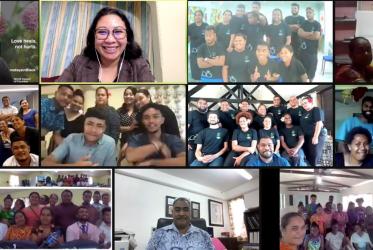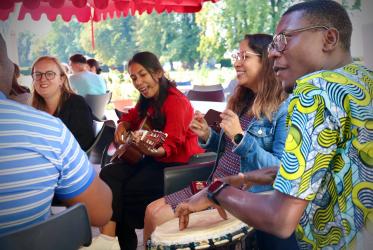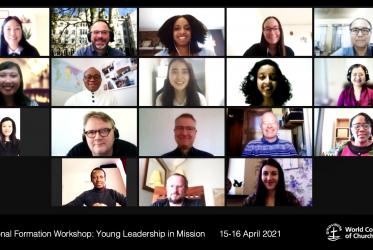WCC programme on Education and Ecumenical Formation in co-operation with the All Africa Conference of Churches
Nairobi, Kenya, KCCT, 23 - 28 June 2000
(The following is a slightly abridged version of the report written by the consultation participants.)
Summary
Background
At the VIIIth Assembly of the World Council of Churches (WCC) in Harare/Zimbabwe (December 1998) the member churches recognised the need for the churches to improve their fellowship as a learning community. This opportunity for the church to be a learning community has expressed itself through various exchanges and partnerships fostered by local congregations, church districts, Regional Ecumenical Organisations, National Councils of Churches and ecumenical centres.
Participating in these exchanges and partnerships further broadened many Christians' understanding of the universality of the Christian faith and showed that we can learn from as well as help each other in times of need. Various people involved in these exchange programmes were eager to evaluate these experiences in terms of the methodologies applied and the learning achieved.
It is with this in mind that the WCC programme on Education and Ecumenical Formation (EEF) in cooperation with the Christian Family Life Education (CFLE) desk of the All Africa Conference of Churches (AACC) held the above-named consultation with a group of Africans from ten countries who have participated in a wide range of exchange programmes and partnerships.
Objectives:
This consultation enabled participants to
- Reflect on and evaluate their experiences in terms of ecumenical learning
- Critically examine the terms "partnerships", "encounters", "ecumenical learning", and interpret them from an African perspective.
- Explore ways of making partnerships and encounters tools for ecumenical learning.
- Develop guidelines on ecumenical learning for the churches.
Core Issues:
The core issues tackled in the consultation included:
- definition of the word partnership,
- description of encounters and ecumenical learning opportunities.
Partnership
Definition of this word from an African perspective proved to be difficult. The word itself was borrowed by the church from the secular register, not from the Bible. In order to construct an acceptable definition, it was necessary to first conceptualise the word from an African perspective. Words like "marriage", "family", "work", "sharing" were very helpful in in this effort.
The word "partnership" does not seem to exist in any African language. Asked to volunteer what came closest in meaning to the western concept of partnership in their languages, participants gave us words like: oneness, family, mutuality, and togetherness, among others. They agreed that:
from an African perspective, the word partnership is difficult to interpret. Adequate terms found in our various languages point to a relationship or fellowship of family, marriage, and co-operation in work. Thus, Christian partnership would mean a meeting in which two or more sections of the people of God relate to one another to find value in working together and sharing their mutual experiences in the love of God.
Encounters
The participants recalled the encounters they had had during exchange experiences as well as in other ecumenical situations. Exchange encounters had resulted in new and lasting insights... as long as participants had been open to cultural and religious surprises. In addition new and lasting friendships were made.
Participants agreed that such experiences challenge partners' faith. Some experienced cultural shock, which in time nevertheless increased mutual understanding and respect. In some cases, however, the encounters left some individuals feeling that they had not participated equally in the programme.
Ecumenical learning
Participants found it easier to define ecumenism from the African perspective than the concept of partnership. The spirit of togetherness is deeply rooted in African culture. As John M’biti says, a person exists because the community exists, and the community exists because the person exists. The concept of togetherness is present in African languages and ways of life.
Ecumenical encounters provide occasions where participants are able to express their faith and thereby come to appreciate the universality/catholicity of the faith. As they sing hymns, share in sacraments as well as scripture readings and prayers, ecumenical gatherings express the catholicity of the church and ecumenical learning is fostered.
Recommendations:
Participants recommended that
1. local, regional, and intra-continental partnerships be given greater priority than at present;
2. structures to facilitate the dissemination of information and enable transparent and accountable relationships be created so that the benefits of partnership encounters filter to the level of the congregation;
3. discussion of justice, peace, integrity of creation, spirituality and "other issues related to our common humanity" form the basis of our ecumenical relationships;
4. all parties to proposed exchanges or partnerships be properly oriented with regard to rules and goals prior to commencement, and the activity be regularly evaluated;
5. representatives of congregations, church districts and churches seek to maximize the learning benefits for all, while sending bodies and groups use their representatives to further their own ecumenical thought
6. the search for and exploration of ways of expressing the concept of "partnership" from an African perspective continue.
The consultation participants committed themselves "to invigorate to ongoing partnerships" and to use their experiences to initiate new ones. The also commited themselves to be accountable to each other about their work and to keep each other informed.



